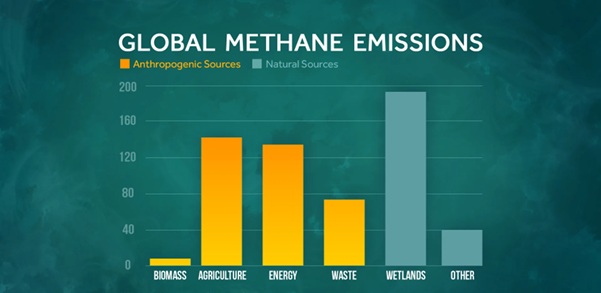
- Recently, the COP29 Presidency launched the “Methane Reduction from Organic Waste Declaration.”
- This initiative supports the Global Methane Pledge (GMP) launched at COP26 in 2021.
- The aim is to reduce methane emissions from organic waste and help achieve targets under Nationally Determined Contributions (NDCs) in the future.
- India has not signed this declaration.
Global Methane Pledge (GMP)
- Launched at COP26 by the European Union and the United States, the GMP aims to achieve at least a 30% reduction in global methane emissions by 2030.
- It is a voluntary program encouraging all parties to adopt methane reduction measures.
Why Reducing Methane Emissions is Important
- Major Contributor to Global Warming: Methane (CH₄) has a global warming potential (GWP) ~28 times higher than CO₂. Since the industrial revolution, it has contributed approximately 30% to global warming.
(Source: IEA, Global Methane Tracker, 2025)
- Rapid Increase in Atmospheric Methane: Recent observations indicate a three-year record high rise in atmospheric methane levels.
(Source: WMO, Greenhouse Gas Bulletin)
Measures to Reduce Methane Emissions
At the Global Level:
- EMIT (Earth Surface Mineral Dust Source Investigation)
- AVIRIS-NG (Airborne Visible Infrared Imaging Spectrometer – Next Generation)
- Global Methane Initiative (2004)
- Methane Alert and Response System (MARS)
In India:
- National Mission for Sustainable Agriculture (NMSA)
- Direct Seeded Rice Technology
- Crop Diversification Programs
- Galvanizing Organic Bio-Agro Resources (GOBAR-Dhan) Scheme
- National Livestock Mission
Challenges for India
- Rice Production: Reducing methane emissions may affect the livelihoods of small and marginal farmers. India is the largest rice producer and exporter in the world.
- Large Livestock Population: Despite improved feed and management, methane emissions from enteric fermentation and manure remain a significant source.
This is why India has not yet joined the GMP.
Conclusion
Effectively reducing methane emissions requires a combination of global and national measures:
- Promote international initiatives
- Improve livestock feed and management
- Adopt circular organic waste management
- Use innovation-based technical solutions, such as low-energy combustion engines and landfill biocovers
Methane reduction is not only an environmental necessity but should also be implemented as a strategy balancing social and economic considerations.



